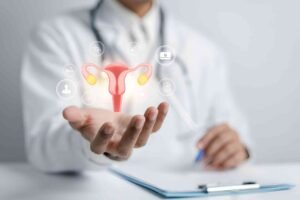Understanding the Symptoms of PCOS: A Comprehensive Guide
Understanding the Symptoms of PCOS: A Comprehensive Guide
Polycystic Ovary Syndrome (PCOS) is a common endocrine disorder affecting women of reproductive age. It is characterized by a combination of symptoms that can vary widely in severity and presentation. Understanding these symptoms is crucial for early diagnosis and effective management. In this comprehensive guide, we will explore the various symptoms of PCOS, the underlying causes, and the available treatment options.
What is PCOS?
PCOS is a hormonal disorder that affects the ovaries. It is one of the leading causes of female infertility and can also have a significant impact on a woman’s overall health. The syndrome is named after the small cysts that often form on the ovaries, although not all women with PCOS have these cysts. The exact cause of PCOS is unknown, but it is believed to be related to a combination of genetic and environmental factors.
Common Symptoms of PCOS
The symptoms of PCOS can vary greatly among individuals. Some women may experience only a few mild symptoms, while others may have multiple, more severe symptoms. Here are some of the most common symptoms associated with PCOS:

Irregular Menstrual Cycles
One of the hallmark symptoms of PCOS is irregular menstrual cycles. Women with PCOS may experience infrequent, irregular, or prolonged menstrual periods. This irregularity is due to the ovaries not releasing eggs regularly, which can also lead to difficulties in conceiving.
Excess Androgen Levels
Women with PCOS often have elevated levels of androgens, which are male hormones present in all women. Elevated androgen levels can lead to several symptoms, including:
- Hirsutism: Excess hair growth on the face, chest, back, and other areas where men typically grow hair.
- Acne: Persistent or severe acne that does not respond well to typical treatments.
- Alopecia: Thinning hair or male-pattern baldness.
Polycystic Ovaries
As the name suggests, many women with PCOS have polycystic ovaries. These are enlarged ovaries that contain numerous small cysts. However, not all women with PCOS have polycystic ovaries, and the presence of these cysts is not necessary for a diagnosis.
Weight Gain and Difficulty Losing Weight
Many women with PCOS struggle with weight gain and find it challenging to lose weight. This is partly due to insulin resistance, a common feature of PCOS that makes it difficult for the body to use insulin effectively.
Insulin Resistance
Insulin resistance is a condition in which the body’s cells do not respond properly to insulin, leading to elevated blood glucose levels. This can increase the risk of developing type 2 diabetes. Symptoms of insulin resistance include darkening of the skin, particularly in the neck creases, armpits, and groin, a condition known as acanthosis nigricans.
Fatigue and Mood Changes
Many women with PCOS experience chronic fatigue and mood changes, including symptoms of depression and anxiety. These symptoms can be exacerbated by hormonal imbalances and the stress of managing a chronic condition.
Fertility Issues
PCOS is one of the leading causes of infertility in women. The hormonal imbalances associated with the condition can interfere with ovulation, making it difficult to conceive. Even when ovulation occurs, the quality of the eggs may be compromised, further complicating conception efforts.
The Underlying Causes of PCOS Symptoms
The exact cause of PCOS is not fully understood, but several factors are believed to contribute to the development of the condition and its symptoms:
Hormonal Imbalances
Women with PCOS often have an imbalance of reproductive hormones, including increased levels of androgens and luteinizing hormone (LH), and decreased levels of follicle-stimulating hormone (FSH). This imbalance can disrupt the normal process of ovulation, leading to irregular menstrual cycles and other symptoms.

Insulin Resistance and Hyperinsulinemia
Insulin resistance is a common feature of PCOS, and it plays a significant role in the development of symptoms. When the body’s cells do not respond properly to insulin, the pancreas produces more insulin to compensate. Elevated insulin levels can increase androgen production by the ovaries, leading to symptoms such as hirsutism and acne.
Genetic Factors
PCOS tends to run in families, suggesting a genetic component to the condition. While no single gene has been identified as the cause of PCOS, research indicates that multiple genes may contribute to the development of the disorder.
Inflammation
Chronic low-grade inflammation is often present in women with PCOS. This inflammation can contribute to insulin resistance and other metabolic complications associated with the condition.
Diagnosing PCOS
Diagnosing PCOS can be challenging due to the variability in symptoms and the overlap with other conditions. The diagnosis is usually made based on a combination of clinical signs, symptoms, and diagnostic tests. The following criteria are commonly used:
Rotterdam Criteria
The Rotterdam criteria require at least two of the following three features for a diagnosis of PCOS:
- Irregular or absent ovulation: Manifested as irregular or absent menstrual periods.
- Elevated androgen levels: Determined through clinical signs (e.g., hirsutism, acne) or blood tests.
- Polycystic ovaries: Identified through ultrasound imaging.

Managing the Symptoms of PCOS
While there is no cure for PCOS, various treatments and lifestyle changes can help manage the symptoms. The approach to treatment often depends on the specific symptoms and the individual’s goals, such as managing hirsutism, regulating menstrual cycles, or improving fertility.
Lifestyle Modifications
Lifestyle changes, including diet and exercise, are often the first line of treatment for managing PCOS symptoms. These changes can help with weight management, improve insulin sensitivity, and regulate menstrual cycles.
- Diet: A balanced diet that is low in refined carbohydrates and high in fiber can help manage blood sugar levels and reduce insulin resistance.
- Exercise: Regular physical activity can improve insulin sensitivity and help with weight loss. It can also boost mood and reduce symptoms of depression and anxiety.

Medications
Several medications can be used to manage the symptoms of PCOS:
- Hormonal Birth Control: Oral contraceptives can help regulate menstrual cycles, reduce androgen levels, and manage symptoms such as acne and hirsutism.
- Anti-Androgens: Medications like spironolactone can reduce androgen levels and alleviate symptoms like excessive hair growth and acne.
- Metformin: This medication is commonly used to improve insulin sensitivity and regulate menstrual cycles, particularly in women with insulin resistance.
- Fertility Treatments: For women trying to conceive, medications such as clomiphene citrate or letrozole can stimulate ovulation. In some cases, assisted reproductive technologies like in vitro fertilization (IVF) may be recommended.
Hair Removal and Skin Treatments
For managing hirsutism and acne, various cosmetic and dermatological treatments can be helpful:
- Hair Removal: Methods such as laser hair removal, electrolysis, or topical creams can reduce unwanted hair.
- Acne Treatment: Topical or oral medications, such as retinoids or antibiotics, can help manage acne symptoms.
Psychological Support
Managing the emotional and psychological aspects of PCOS is crucial. Counseling, support groups, or therapy can provide valuable support for women dealing with the emotional challenges of PCOS.
Long-Term Health Implications
PCOS can have several long-term health implications, making it essential to manage the condition effectively:
- Metabolic Syndrome: Women with PCOS are at an increased risk of developing metabolic syndrome, which includes conditions like high blood pressure, high cholesterol, and increased risk of heart disease.
- Type 2 Diabetes: Insulin resistance increases the risk of developing type 2 diabetes.
- Endometrial Cancer: Irregular menstrual cycles and lack of ovulation can increase the risk of endometrial cancer due to prolonged exposure to estrogen without progesterone.

Conclusion
Polycystic Ovary Syndrome (PCOS) is a complex condition with a wide range of symptoms that can affect various aspects of a woman’s health. Understanding the symptoms and underlying causes is essential for early diagnosis and effective management. While there is no cure for PCOS, a combination of lifestyle changes, medications, and supportive therapies can help manage the symptoms and reduce the risk of long-term health complications. If you suspect you have PCOS, consult with a healthcare provider to explore your symptoms and develop a personalized treatment plan.


